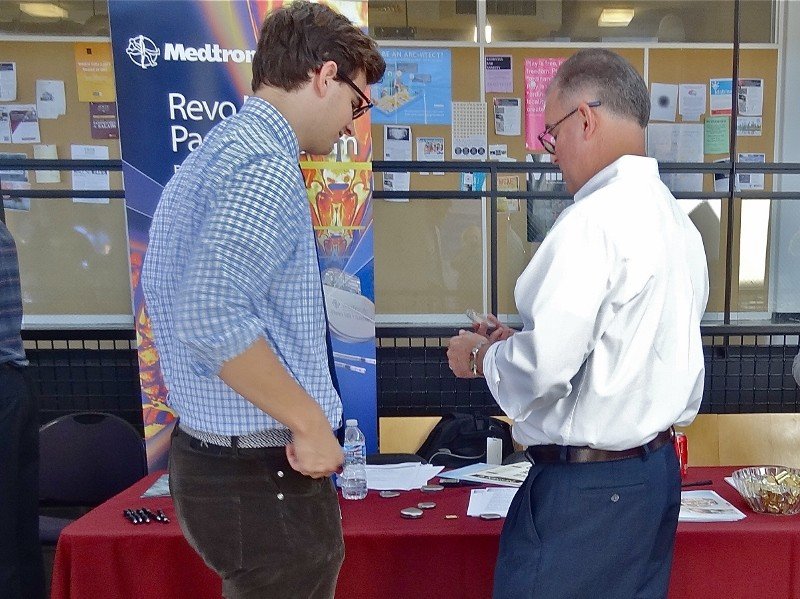Prospective Students
“After completing my co‐op I have to say that participating in this program is probably the best decision I could have made in my undergraduate career.” ME Co-op Student
Welcome Students
The CSE Co-op Program at the University of Minnesota has been providing students with career opportunities for more than 65 years, and we're proud of that legacy.
If you aren't quite certain what it means to be an engineer, our program will provide you with a firsthand experience of working as an engineer under the guidance and supervision of experienced engineers.
If you are looking to enhance your employment prospects, gain work experience, earn money for college, or invest in your own professional development, the Co-op Program can help you with all of those very worthwhile goals.
The Co-op Program provides opportunities for the following engineering majors.
- Aerospace Engineering
- Biomedical Engineering
- Chemical Engineering
- Civil Engineering
- Computer Engineering
- Computer Science
- Electrical Engineering
- Environmental Engineering
- Geoengineering
- Industrial and Systems Engineering
- Materials Science and Engineering
- Mechanical Engineering
Other engineering majors should check with their department for co-op opportunities.
This section of the website has important information for prospective students about the program including eligibility requirements, application process, and course requirements. Please look through it and familiarize yourself with the rules and procedures of the Co-op Program. If you have any questions, contact the Co-op office at co-op@umn.edu and we will be happy to answer your questions.
Program Overview
The CSE Co-op Program offers you the ability to work full-time for a company of your choosing for two work terms (usually a summer and a semester). While completing the co-op, students earn academic credit by enrolling in an online, synchronous course each term, CSE 4896 (2 credits) and 4996 (2 credits). *Both courses are required and students must commit to two semesters. Most students do not take other courses during their co-op so that they can focus on the work experience. More information about the co-op courses can be found on the Required Co-op Courses page.
Before applying to the program, please be sure you meet with your major/departmental advisor to ensure that enrollment in CSE 4896 and 4996 will fulfill your major requirements. Please also discuss the most appropriate semesters to complete a co-op to help keep you on track with your degree progress.
Co-op Program Benefits
Your participation in the Co-op Program will offer many opportunities beneficial to you both now and in the future, including:
- Gaining valuable major-related experience in your field of interest
- Increasing your understanding of classroom theory through practical experience
- Earning a competitive wage with an average starting wage of $25 per hour.
- Gaining valuable networking skills within the company and industry in general
- Building a great resume for future jobs
- Improving your after-graduation job prospects
- Exploring career goals and options
- Earning four academic credits
- Maintaining full-time status, while continuing scholarships, grants, and financial aid
Over 1,000 students graduate with a degree from the College of Science and Engineering each year. Co-op students graduate with more than a degree. They graduate with significant practical knowledge and work experience giving them a significant competitive advantage in today's job market.
Co-op Program Goals
Real-World Work Experience
The first goal of the Co-op Program is to provide students with an understanding of an engineer’s role in the technical world. The program provides an opportunity to apply some of their knowledge of fundamental theory to practical problem solving. In most cases it helps students select a direction in the broad field of engineering and thus influences their selection of elective courses. The experience motivates students to plan and successfully complete their academic program.
Gain Transferable Skills
The second and equally important goal is to improve students' non-technical skills that are necessary in a business environment. Students take online courses during their work periods. The courses cover a diverse set of material including effective business writing, engineering ethics, networking, team-work, the patent process, the business model canvas, and dealing with conflicts at work. Some of the assignments in the course require students to conduct short interviews with colleagues and talk to their supervisor.
Co-op versus Internship
Internships are generally completed over a summer and last 10-12 weeks, a co-op usually takes place over a summer plus one full semester. The Co-op Program is reserved for those students who intend to work at one company for about 7-8 months. Students who are completing internships may not enroll in the co-op courses.
Co-op Program Application Process
Students participating in the Co-op Program follow the general process below:
- Inform the Co-op Program about your interest in participating in a co-op by filling out this Student Interest Form. The Co-op program will email you about open co-op opportunities.
- Locate a co-op position. Positions can be located via Handshake or via another method. Students must have an accepted job offer in order to apply to the program.
- Once you have been offered a co-op position, submit your application via Handshake and receive approval from the co-op office.
- Enroll in a required online course during each of your work semesters to earn credit while you work.
More information about this process can be found in the locating and applying for a co-op page.
